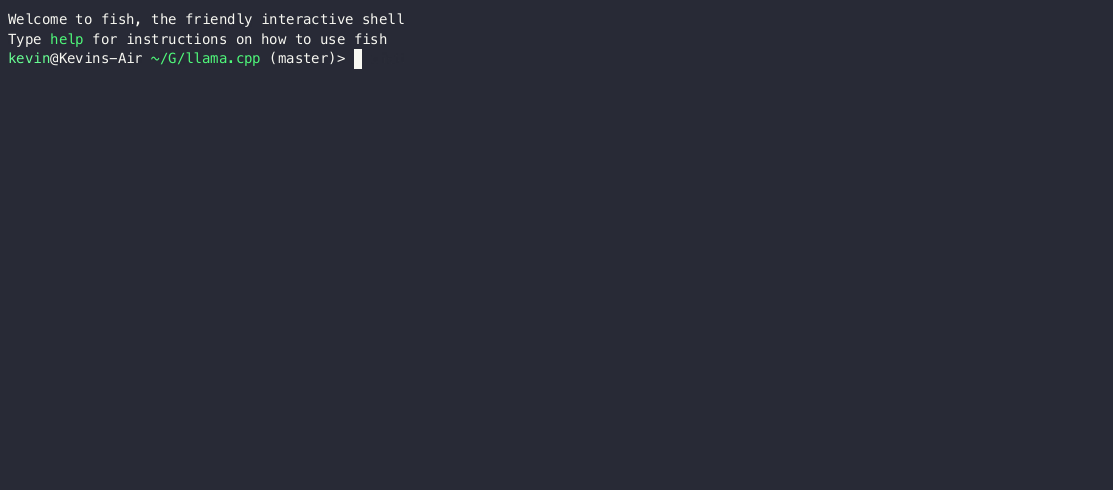Run a fast ChatGPT-like model locally on your device. The screencast below is not sped up and running on an M2 Macbook Air with 4GB of weights.
This combines the LLaMA foundation model with an open reproduction of Stanford Alpaca a fine-tuning of the base model to obey instructions (akin to the RLHF used to train ChatGPT) and a set of modifications to llama.cpp to add a chat interface.
Get Started (7B)
Download the zip file corresponding to your operating system from the latest release. On Windows, download alpaca-win.zip, on Mac (both Intel or ARM) download alpaca-mac.zip, and on Linux (x64) download alpaca-linux.zip.
Download ggml-alpaca-7b-q4.bin and place it in the same folder as the chat executable in the zip file. There are several options:
Once you've downloaded the model weights and placed them into the same directory as the chat or chat.exe executable, run:
The weights are based on the published fine-tunes from alpaca-lora, converted back into a pytorch checkpoint with a modified script and then quantized with llama.cpp the regular way.
Getting Started (13B)
If you have more than 10GB of RAM, you can use the higher quality 13B ggml-alpaca-13b-q4.bin model. To download the weights, you can use
# Any of these commands will work.
curl -o ggml-alpaca-13b-q4.bin -C - https://gateway.estuary.tech/gw/ipfs/Qme6wyw9MzqbrUMpFNVq42rC1kSdko7MGT9CL7o1u9Cv9G
curl -o ggml-alpaca-13b-q4.bin -C - https://ipfs.io/ipfs/Qme6wyw9MzqbrUMpFNVq42rC1kSdko7MGT9CL7o1u9Cv9G
curl -o ggml-alpaca-13b-q4.bin -C - https://cloudflare-ipfs.com/ipfs/Qme6wyw9MzqbrUMpFNVq42rC1kSdko7MGT9CL7o1u9Cv9G
# BitTorrent
magnet:?xt=urn:btih:053b3d54d2e77ff020ebddf51dad681f2a651071&dn=ggml-alpaca-13b-q4.bin&tr=udp%3A%2F%2Ftracker.opentrackr.org%3A1337%2Fannounce&tr=udp%3A%2F%2Fopentracker.i2p.rocks%3A6969%2Fannounce&tr=udp%3A%2F%2Ftracker.openbittorrent.com%3A6969%2Fannounce&tr=udp%3A%2F%2F9.rarbg.com%3A2810%2Fannounce
https://btcache.me/torrent/053B3D54D2E77FF020EBDDF51DAD681F2A651071
https://torrage.info/torrent.php?h=053b3d54d2e77ff020ebddf51dad681f2a651071
Once you've downloaded the weights, you can run the following command to enter chat
./chat -m ggml-alpaca-13b-q4.bin
Getting Started (30B)
If you have more than 32GB of RAM (and a beefy CPU), you can use the higher quality 30B alpaca-30B-ggml.bin model. To download the weights, you can use
git clone https://huggingface.co/Pi3141/alpaca-30B-ggml
Once you've downloaded the weights, you can run the following command to enter chat
./chat -m ggml-model-q4_0.bin
Building from Source (MacOS/Linux)
git clone https://github.com/antimatter15/alpaca.cpp
cd alpaca.cpp
make chat
./chatBuilding from Source (Windows)
- Download and install CMake: https://cmake.org/download/
- Download and install
git. If you've never used git before, consider a GUI client like https://desktop.github.com/ - Clone this repo using your git client of choice (for GitHub Desktop, go to File -> Clone repository -> From URL and paste
https://github.com/antimatter15/alpaca.cppin as the URL) - Open a Windows Terminal inside the folder you cloned the repository to
- Run the following commands one by one:
cmake . cmake --build . --config Release
- Download the weights via any of the links in "Get started" above, and save the file as
ggml-alpaca-7b-q4.binin the main Alpaca directory. - In the terminal window, run this command:
- (You can add other launch options like
--n 8as preferred onto the same line) - You can now type to the AI in the terminal and it will reply. Enjoy!
Credit
This combines Facebook's LLaMA, Stanford Alpaca, alpaca-lora and corresponding weights by Eric Wang (which uses Jason Phang's implementation of LLaMA on top of Hugging Face Transformers), and llama.cpp by Georgi Gerganov. The chat implementation is based on Matvey Soloviev's Interactive Mode for llama.cpp. Inspired by Simon Willison's getting started guide for LLaMA. Andy Matuschak's thread on adapting this to 13B, using fine tuning weights by Sam Witteveen.
Disclaimer
Note that the model weights are only to be used for research purposes, as they are derivative of LLaMA, and uses the published instruction data from the Stanford Alpaca project which is generated by OpenAI, which itself disallows the usage of its outputs to train competing models.

